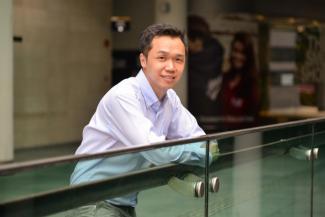
The Internet has become a big part of our everyday life, but we are often unaware of the legal implications of our online activities. SMU Associate Professor Warren Chik tracks the developments of this emerging field.
Back to Research@SMU Issue 14 (May 2014)

Photo Credit: Cyril Ng
By Rebecca Tan
SMU Office of Research (5 May 2014) – Information technology (IT) has facilitated the creation and sharing of content in an unprecedented fashion. From movies to music, pictures and personal data, a vast amount of information is available online at the click of a mouse. Despite this ubiquity, most IT users seldom stop to think about the legality of their actions in cyberspace.
Associate Professor Warren Chik of the Singapore Management University (SMU) School of Law hopes that as users of digital information mature, they will appreciate that the online space is not free from jurisdiction. His research focuses on intellectual property (IP) and personal data protection, two legal domains that have immediate and direct impact on almost every Internet user.
“These issues are of interest to the public because it determines the kind of information they can share online, and the fact that they can create or borrow from online sources, without running against the law, such as infringing copyrights or coming up with something defamatory,” he says.
Intellectual property: What constitutes fair use?
Designed to protect the interest of creators, copyrights allow creators to retain control over and reap financial reward from what they have produced, explains Professor Chik. Originally devised to regulate the printing of books at the advent of the printing press, copyrights today have been extended to various forms of media such as pictures or movies. However, what constitutes fair use of copyrighted material can vary from medium to medium.
“There are differences in terms of what format a particular content is being shared,” he says. “For example, one is inclined to use a two-dimensional image in its entirety. However, in the case of videos, say a two-hour movie, it might be acceptable if one extracts only five minutes of it. In other words, substantiality is important, but so is the medium.”
“For music, a single piece can be broken up in many different ways. They can break it up into lyrics, melody, beat, and so on, making the issue of substantiality more complicated. It is more straightforward for written documents and images, because it is easier to say how much of a person’s work has been plagiarised, as opposed to how much of a piece of music or video clip has been taken,” he continues.
Although tests such as substantiality have been spelt out under the law, their application to different real-life situations is difficult, because the uniqueness of any content is determined by relative rather than absolute standards. Nonetheless, it is the challenging and dynamic nature of the research, and the opportunity to make a public impact that draws Professor Chik to this subject.
“I feel my work has a wider audience, for it has both academic and practical value. It is useful for anybody who deals with creative content, especially when almost everyone has access to the Internet and online content nowadays,” he shares.
In collaboration with Associate Professor Saw Cheng Lim from the SMU School of Law, Professor Chik has written a series of articles on IP law relating to online video streaming platforms. He also engages in discussions on information security laws with colleagues from the SMU School of Information Systems. These meetings have resulted in shared literature under the Creative Commons domain.
Protecting personal data
While IP laws protect ideas and products, personal data protection laws seek to safeguard an individual’s private information, in addition to the kind of information they receive. “Data protection is becoming more critical because people are starting to realise the power of their own data, especially their contact information which is highly sought by companies for outreach and marketing purposes,” Professor Chik notes.
“In my research, I try to help people understand the areas through which they can influence companies with regard to the use of their personal information, so that they can control the kind of communication they receive.”
Professor Chik’s work also examines personal data from an organisational perspective, specifically, the extent to which organisations need to engage individuals when it comes to collecting and using their information.
“I’m addressing it in a practical way – what are the parameters of the legislation, and how does it affect different stakeholders, especially organisations that have to deal with personal information. I look at what information falls within and outside their purview,” he says.
As the data protection laws in Singapore are relatively new and rapidly evolving, Professor Chik examines where individual provisions are taken from, and how they differ from other countries.
“Our government has dedicated much effort to analysing aspects of data protection law that are relevant to the local context. What it has put forward is tailored to the perceived needs of Singaporeans. The result is a balanced approach that looks at both individuals’ right to their own information, and organisations’ need for data,” he says.
Ultimately, Professor Chik would like to see more cases being addressed in the courts, as the legal system works out its interpretation of the law.
“As an academic, what I am doing now is filling in the gaps between the time the statutes emerge, to the time the courts actually enforce them,” Professor Chik says. “I hope that at some point, I would get to see the courts deal with these issues and address some of the concerns I have raised in my research. I would like to see more robust discourse, more interest generated, and more clarity and guidance from the courts. Not just among academics or lawyers, but also amongst common people because these things do concern them as well.”